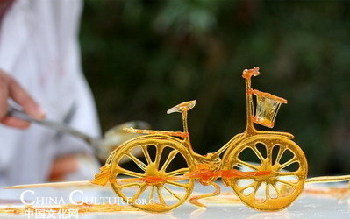| Home > China Feature |
Xishi: one of the great four beauties in ancient China
 |
|
Portrait of Xishi ( one of the great four beauties in ancient China) |
Xishiis known as one of the Four Great Beauties of China. Celebrated as a woman of extraordinary natural beauty with a universal appeal,Xishiwas the daughter of a tea trader in Zhuji County in the state of Yue (currentZhejiang Province) around 500BC during theSpring and Autumn Period(770-476BC). At that time, China was divided into several kingdoms fighting for power.
When the State of Yue was vanquished by the State of Wu, the King of Yue, Gou Jian was forced to serve Prince Fuchai of Wu for three years. On his release, King Gou Jian slept on brushwood and drank gall before each meal to remind himself of the humiliation his country had suffered. He plotted the downfall of his conqueror as soon as he was released. He commissioned men to search far and wide for a woman whom he could send as a tribute to Prince Fuchai of Wu. Xishi, whose beauty was much talked of even from early childhood, was selected for this task and sent to the capital.
King Gou Jian approved of the choice and had Xishi trained in royal court etiquette. Gou Jian ordered his minister Fan Li to take Xishi to the Prince of Wu as a tribute gift from Yue. During the journey, Xishi fell deeply in love with the wise minister. Fan Li also grew to admire this courageous lady who was willing to give her life for her country. Consequently, before they parted, they made a secret pledge of undying love.
They arrived at the capital of Wu and Prince Fuchai was enchanted by Xishi's appearance and doted on her. Gradually he began to neglect his political duties, preferring to idle away his time with Xishi. He frequently took her out on carriage rides to the noisy and prosperous sections of the city. On these rides, he liked to boast to those around him that he had won the heart of the most beautiful woman in the world.
Xishi, however, never lost sight of her mission. Her aim was to bewitch Prince Fuchai so that his subjects would grow restless and his friends would desert him. Xishi managed to alienate Prince Fuchai and his most-trusted general Wu Ziyi, resulting in the suicide of Wu Ziyi at the coercion of Prince Fuchai. The political chaos that ensued would enable the King of Yue to invade the state of Wu, recompensing him for his former humiliation.
The King of Yue finally annexed the State of Wu. Following the suicide of Prince Fuchai of Wu, Xishi disappeared from public life.
Some say Xishi was drowned into theYangtze Riverby the irate Wu people after the death of Prince Fuchai and the defeat of Wu State; others say Xishi lived in relative obscurity with Fan Li who became a successful trader.
This story is unique in the history of feudal China as no one has ever found fault with Xishi, even though she had caused the downfall of the State of Wu. The 2,500 year-old-tale is well known in China, and has also spread to other Asian countries like South Korea, Japan and Singapore. The tale of Xishi incorporates many aspects of traditional Chinese culture in its characters, customs and places. It has also been made into dramas and plays.
Art
 more
moreSculpture in Qianling Mausoleum
The sculpture of Qianling Mausoleum is the main relic of the ground ...

A Sweet Art:Sugar Painting
In and around China’s southwestern Sichuan Province, it is usual to ...

Chinese Treasure Displayed at Sha...
There are four treasures of the Chu Minority Culture displayed at th...

Custom
 more
moreWeb Dictionary
Martial Arts
12 Excellent Kung Fu Movies in 2010 You Shouldn'...
Martial Arts film can be artful and stunningly beautiful, and they...
Shaolin Monks Perform Martial Art in Moscow
A monk from China's Shaolin Temple performs Shaolin mar...
Chinese Kungfu Films Ready for the New Year seas...
The two Chinese blockbusters Let the Bullets Fly and If You Are th...





 print
print  email
email  Favorite
Favorite  Transtlate
Transtlate 







